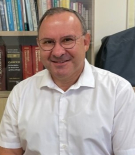Prof. Martin Ellis
Thrombosis and Hemostasis, Meir Medical Center, Israel

Professor Ellis is the director of the Blood Bank and emeritus director of the Hematology Institute at the Meir Medical Center. He completed his medical degree and internship in Johannesburg, South Africa and his medical residency at the Meir Medical Center in Kfar Saba, Israel. He went on to do a fellowship in Hematology at the Harvard Medical School in Boston.
He is Associate Professor of Hematology in the Faculty of Medicine at the Tel Aviv University where he has been a member of staff since 1991 and has engaged in undergraduate teaching uninterruptedly since then. He is also the Chairman of the Israel Society of Hematology. He was the founding chairman of the Israel Myeloproliferative Neoplasms (MPN) and Israel Transfusion Medicine Working Groups.
Prof Ellis is a member of the MPN working groups of the European Leukemia Network and the European Hematology Association.
Prof. Ellis’s clinical research interests are the biology and treatment of MPN-related thrombosis and the use of direct oral anticoagulant therapy for thrombotic diseases. He has performed a number of national and international studies of JAK inhibitor treatment for myelofibrosis and of the treatment of thrombotic complications of the myeloproliferative neoplasms. He has published numerous papers focused on the current management of MPNs and using meta-data, performed ground-breaking research in a “real-world” demonstrating the importance of appropriate dosing of the direct oral anticoagulants.
Most recently Prof Ellis has engaged in active collaboration in translational research in hemophagocytic lymphohistiocytosis (HLH), focusing on HLH associated with hematologic malignancies. He has conducted research based an international cohort of patients which has led to the description of a simplified diagnostic index for this disease, recently published in the premier hematology journal, Blood. His current research efforts in this area are focused on the molecular and cellular basis for this syndrome as well as developing improved diagnostic and prognostic tools in prospective clinical studies.
He is frequently invited to speak at national and international meetings.
